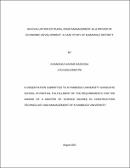| dc.description.abstract | Rural roads form the largest part of the road network and the main form of access to the rural communities. The poor state of rural road networks not only affects transport of goods and services but also the economic growth. This study sought to evaluate rural road network management as a driver of economic development using Kabarole District as a case study. A mixed design method was used where qualitative and quantitative data were collected by use of interviews, visual inspection and questionnaire. The population composed political and technical staff involved in rural road management represented by a sample size of 95 people. Data was analysed using SPSS and Ms Excel spreadsheet and mean values computed. Factors above the mean of means were considered the most significant. Findings established that high construction costs (μ=4.22), delayed releases (μ=3.91), insufficient funding (μ=3.79), bad weather (μ=4.0) and inadequate equipment (μ=3.56) are the major factors affecting effective rural road management. A framework was developed considering roads as capital investment where maintenance will be valued above new construction. The study recommends application of the framework emphasizing an effective maintenance culture, introduction of public private partnerships in the road maintenance works and encouragement of public participation in the provision of basic facilities through various community self-help developments to reduce dependence on central government. If equal attention was paid to the development and maintenance of the rural roads there would be sufficient, safe and reliable physical access to social services; reduced travel time that would be used for wealth creation. | en_US |

